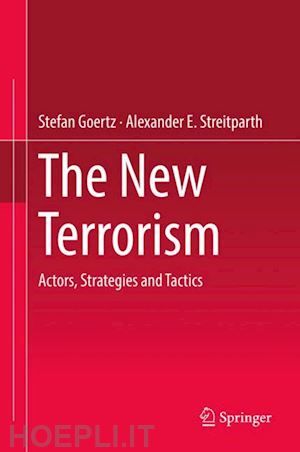
Questo prodotto usufruisce delle SPEDIZIONI GRATIS
selezionando l'opzione Corriere Veloce in fase di ordine.
Pagabile anche con Carta della cultura giovani e del merito, 18App Bonus Cultura e Carta del Docente
In light of asymmetrical security threats in western democracies as well as in conflict regions, this timely book examines the actors, strategies and tactics of Islamist terrorism and transnational organized crime around the globe. The authors develop an interdisciplinary approach to understanding the ideologies, forms of cooperation, and technological means used in new forms of terrorism.
The book starts with an empirical analysis of the new Jihadism as a global Islamist theology and strategy. Furthermore, it investigates the interaction, cooperation and fusion of transnational organized crime and Islamist terrorism and highlights new communication technologies as vital tools for terrorism. Lastly, the book provides an analysis of asymmetrical strategies and tactics used by terrorist organisations, and of low-level terrorism. As such, it will appeal to all political scientists and criminologists studying terrorism, as well as to professionals at various national and international security services.
Stefan Goertz is an Assistant Professor at the University of the German Federal Police (Bundespolizei). His deployments abroad as officer of the German Armed Forces took him to Bosnia and Lebanon. He obtained his Bachelor and Master degrees in Political Science and a PhD in Security Studies and International Relations. He has published more than 100 scientific articles and nine books, making him one of the current German “experts” in the areas of Islamism, Salafism and Jihadism in Germany.
Alexander E. Streitparth is a Staff Officer at the German Armed Forces Operational Communications Centre (Zentrum Operative Kommunikation der Bundeswehr). His deployments abroad took him to the Kosovo and Afghanistan where he worked in the fields of target audience analysis, psychological operations and media advisory. Before joining the army, he was a reserve officer and managing partner of a management and public affairs consultancy. He completed a Master’s degree in Political Science and Modern History in Freiburg in Breisgau, Germany, followed by a Master of Business Administration in Public Affairs and Leadership in Berlin.











Il sito utilizza cookie ed altri strumenti di tracciamento che raccolgono informazioni dal dispositivo dell’utente. Oltre ai cookie tecnici ed analitici aggregati, strettamente necessari per il funzionamento di questo sito web, previo consenso dell’utente possono essere installati cookie di profilazione e marketing e cookie dei social media. Cliccando su “Accetto tutti i cookie” saranno attivate tutte le categorie di cookie. Per accettare solo deterninate categorie di cookie, cliccare invece su “Impostazioni cookie”. Chiudendo il banner o continuando a navigare saranno installati solo cookie tecnici. Per maggiori dettagli, consultare la Cookie Policy.